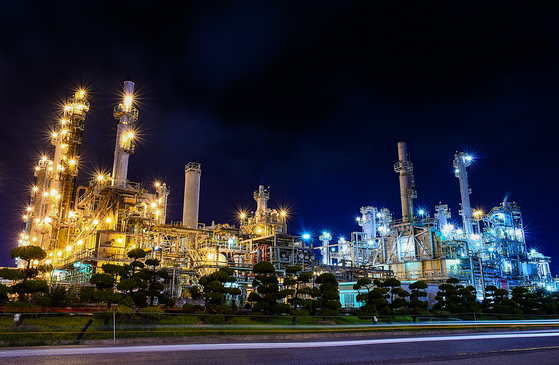
Yeosu National Industrial Complex, the largest petrochemical complex in Korea. The impact of the 2050 Carbon Neutral Declaration is shaking the refinery. Photo Yeosu City Hall
The impact of the 2050 Carbon Neutral Declaration is shaking the refinery. On the outside, the four domestic oil refineries care for words, but the inside is different.
There are many complaints about the one-way policy announcement that came out without consulting with the industry. Some voices say that the government, which used to be a key industry, stigmatized the oil refining industry. Earlier, President Moon Jae-in announced on the 10th that “carbon neutrality is an opportunity for Korea to leap forward as a leading country” and that the government will focus its policy capabilities on realizing carbon neutrality in 2050. By 2050, the net greenhouse gas emissions (emissions-absorption) will be zero.
It is unusual for a refinery that is sensitive to government policy as a regulated industry to complain about. That’s because the government’s carbon-neutral target does not reflect the reality. An oil industry official said, “The fact that the trend of carbon neutrality cannot be countered is that refiners know better than anyone else and do not want to go against it, but carbon neutrality proposed by the government in 2050 is impossible.” This can be easily confirmed by looking at the carbon emission reduction target set by a domestic refinery. Hyundai Oilbank, the first Korean oil refinery to propose a carbon reduction target in September, is a representative example. Hyundai Oilbank proposed a reduction target to reduce carbon emissions from 6.68 million tons last year to 4.99 million tons by 2050. It plans to reduce carbon emissions to the current 70% level by 2050. However, with the government announcement, it is necessary to set a new reduction target. The situation is similar for other refiners.

President Moon Jae-in is giving a speech declaring the ‘2050 Korea Carbon Neutral Vision’ in the office of the main building of the Blue House on the afternoon of the 10th. Blue House Photo Reporters
“High export proportion of petroleum products is impatient to be carbon neutral”
There are also criticisms from the business community that President Moon’s declaration of carbon neutrality was hasty. This is because petroleum products account for 12% of all exports. According to the Korea International Trade Association, last year diesel exports were $15.3 billion (16.94 trillion won), ranking fourth in the overall export item ranking (based on exports). Jet fuel oil ($8.8 billion) and automobile gasoline ($6.4 billion), which are representative petroleum products, also ranked 9th and 12th, respectively. This means that the share of petroleum products in exports after semiconductors and automobiles cannot be ignored. An official from the Petroleum Association said, “The size of domestic refiners’ refining facilities is competitive enough to rank fifth in the world.” You have to worry.” He added, “It is not the United States that is an oil producing country or the European-style carbon-neutral that has abundant alternative energy sources, but Korea has to develop its own carbon-neutral model.”

The road to ‘2050 carbon zero’. Graphic = Reporter Park Kyung-min [email protected]
The National Assembly has a bill to regulate targets for refiners
The refinery, which is recording a trillion unit deficit this year due to Corona 19, is a thorny road both inside and outside. In the National Assembly, there are regulatory bills targeting refiners. A representative example is the amendment to the Local Tax Law, which imposes a local tax of 1 won for each liter of oil produced. This bill was submitted to the National Assembly’s Administrative Safety Committee in June of this year and is being discussed at the standing committee level. An official in the oil industry said, “I hit the back of the head in a situation where it is prone to corona.” A plan to increase the tax imposed on diesel to the level of gasoline is also being discussed at the National Climate Environment Conference. The National Climate Environment Conference is a pan-national organization under the direct control of the President, which was launched last year. Currently, the diesel tax is 530 won per liter, which is lower than the gasoline tax (746 won per liter).
Energy experts point out that it is impossible for a refinery to achieve carbon neutrality without government support. Seung-hoon Yoo, a professor at the Department of Energy Policy at Seoul National University of Science and Technology, said, “To achieve carbon neutrality in the current refinery, closing the refinery is the only way. Having an existing infrastructure is a realistic alternative.” He advised, “The 20 trillion won of oil tax, which the government is walking on petroleum products, is not being used to convert the oil refining industry,” he advised. “The government can use this to develop carbon-neutral technology.”
Reporter Kiheon Kang [email protected]
